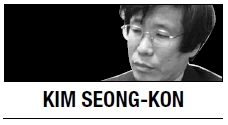Recently, South Korea was disgraced by two embarrassing incidents. One is the cancellation of the SAT exam for the entire country because a considerable number of prospective test takers were allegedly exposed to some of the questions that had been obtained illegally. The other is the accusation that a presidential spokesman sexually harassed a young intern in Washington, D.C. during President’s Park’s recent visit to the States. Culturally speaking, these two unfortunate incidents stem from a Korean culture that is much too lenient on cheating and drinking.

Traditionally, Koreans have often conflated “smart and intelligent” with “cunning and cheating.” It is no wonder, then, many cheaters have long been praised as smart and intelligent people in Korean society. At school, for example, students learn that the two famous historical figures, Huh Saeng and Bong-I Kim Seondal, were extremely smart men. Strictly speaking, however, the former was a merchant who made a fortune by hoarding and manipulating the market, while the latter was a cheater who playfully sold the water of a public river to gullible people. Despite their nature, these two figures have always been all-time favorites of the Korean people.
Koreans also praise conspiring, sly politicians as smart men. But being smart is a bit different from being cunning or sly, since the latter have negative connotations. It is also interesting that Koreans call cheating on exams “cunning,” which indicates that they do not particularly attach stigma to cheating. Historically in Korean society, cheating proves one’s superb intelligence. Thus, the Korean people must think: “Why, then, condemn and criticize cheating?” Besides in Korea, ends frequently justify the means, and ethics are a luxury often set aside to win no matter the costs.
The second embarrassing scandal that hit Korea is the alleged “disgraceful acts” committed by the president’s spokesman while he was accompanying President Park in the States. Such an inappropriate incident can happen when a civilian is abruptly appointed a high-ranking government official; intoxicated by the political power suddenly bestowed upon him, some men forget the high level of decorum and morality required of a public servant.
Reportedly, he the spokesman was drunk when allegedly groped an embassy intern who had been assigned to assist him. Even good men turn into monsters when they are drunk. When they become sober, they try to denounce what they did, insisting that they do not remember. In Korea, indeed, many disasters and mistakes happen while one is drunk.
Thus there is a Korean maxim that says, “When you get drunk, you become a dog.” And a dog is not held responsible for what it does. That is why people frequently plead, “I was drunk at that time; I did it under the influence of alcohol.” Surprisingly, then, they are forgiven easily. Koreans tend to believe that it is manly to drink until one gets drunk. That is why Korean men usually visit two or three bars during the course of an evening and why the so-called cocktail bomb is so popular in Korea. In Korea, bravado is perceived as manly, while discretion is almost always regarded as behavior of a sissy.
In college, freshmen welcoming parties, called MT (membership training), frequently turn out to be nightmares when freshman are forced to drink themselves to death. Such a horrific drinking culture creates monsters. Nietzsche once said: “Whoever fights monsters should see to it that in the process he does not become a monster. And if you gaze long enough into an abyss, the abyss will gaze into you.” Perhaps Nietzsche would have said to Korean men: “If you consume too much alcohol for long enough, the drink will consume you.”
Another problem of Korean men is that they tend to look down on women, especially young women. This morning, I received an email from a Korean-American woman who wrote: “Even if sexual harassment may not be common, I notice many older Korean men do not treat young women as equals.
“I remember my friend told me when she was an intern at the Korean Embassy, all they would have her do is make coffee, while they gave the male intern (who was less qualified) substantial tasks. Korean men in general need to revise their thinking.”
The two disgraceful incidents have severely damaged the reputation of South Korea. Because of the SAT cancelation, newspaper columnists have lately called South Korea “a country without conscience” and “a country of cheaters.” In addition, thanks to the sexual harassment scandal, South Korea may also be called, “a country without decorum and morality” and “a country under the influence of alcohol.” Alas! In the eyes of the international community, we have lost our integrity and dignity.
We must put an end to these chronic diseases now and strive to build a nation of honor, conscience and decorum instead. We should no longer tolerate cheating or excuses from drunken men.
By Kim Seong-kon
Kim Seong-kon is a professor of English at Seoul National University and president of the Literature Translation Institute of Korea. He can be reached at sukim@snu.ac.kr. ― Ed.




![[Herald Interview] 'Trump will use tariffs as first line of defense for American manufacturing'](http://res.heraldm.com/phpwas/restmb_idxmake.php?idx=644&simg=/content/image/2024/11/26/20241126050017_0.jpg)

![[Health and care] Getting cancer young: Why cancer isn’t just an older person’s battle](http://res.heraldm.com/phpwas/restmb_idxmake.php?idx=644&simg=/content/image/2024/11/26/20241126050043_0.jpg)

